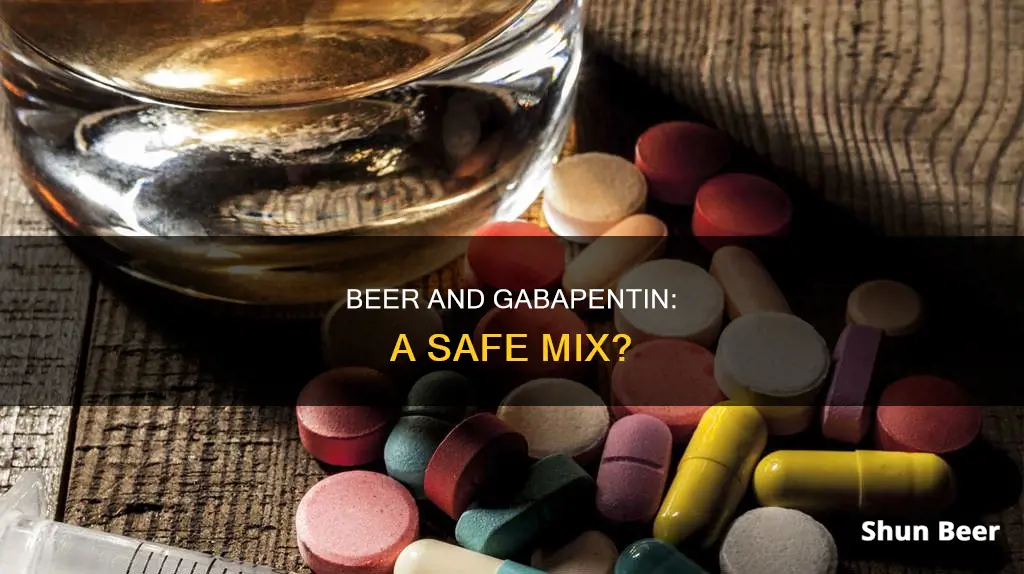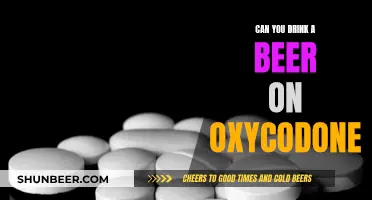
Gabapentin is a prescription drug used to treat nerve pain, seizures, and alcohol withdrawal syndrome. It is not classified as a controlled substance, but it is often involved in substance abuse cases, especially when combined with opioids or alcohol. Mixing gabapentin and alcohol can lead to severe side effects, including increased risk of seizures, overdose, respiratory depression, and even death. Therefore, it is recommended to avoid consuming alcohol while taking gabapentin to prevent adverse effects and dangerous situations.
| Characteristics | Values |
|---|---|
| Should you drink beer on gabapentin? | No, it is not recommended to drink alcohol while taking gabapentin due to the risk of adverse effects and dangerous side effects. |
| Gabapentin brand name | Neurontin |
| Gabapentin use | Treat nerve pain from seizures or shingles, restless leg syndrome, bipolar disorder, migraines, and drug and alcohol withdrawal symptoms |
| Alcohol and gabapentin impact | Amplify each other's effects, increasing the risk of side effects and overdose |
| Side effects | Drowsiness, dizziness, respiratory distress, nausea, vomiting, constipation, diarrhea, cognitive issues, seizures, overdose, and death |
| Alcohol impact on prescription drugs | Can lessen effectiveness, increase concentration levels to toxic amounts, worsen side effects, and cause new symptoms |
| Gabapentin half-life | 5-7 hours |
| Time to eliminate gabapentin from the body | 25-35 hours |
What You'll Learn

Increased risk of seizures, overdose, and death
Gabapentin and alcohol do not mix well together. Combining the two can lead to severe side effects, including an increased risk of seizures, overdose, and death.
Both gabapentin and alcohol are central nervous system (CNS) depressants, which slow down brain activity and body functions. When taken together, they amplify each other's effects, increasing the risk of adverse side effects.
Gabapentin is an anticonvulsant medication used to treat seizures, nerve pain, and restless leg syndrome. It works by reducing brain activity associated with seizures and affecting pain sensations. While generally safe when used as directed, gabapentin can cause mild to severe side effects, including nausea, vomiting, swelling, and cognitive issues.
Alcohol, on the other hand, is a well-known depressant that slows down body functions and impairs cognitive ability and mood stability. When consumed with gabapentin, alcohol can intensify the side effects of the medication, leading to dangerous situations.
The combination of gabapentin and alcohol can result in extreme drowsiness, making activities like driving very dangerous. Additionally, both substances are associated with changes in mood and cognitive function, and combining them can result in severe mood changes, erratic behaviour, and poor decision-making.
Most importantly, mixing gabapentin and alcohol increases the risk of respiratory depression, where breathing becomes dangerously slow and shallow, or even stops. As both substances slow down breathing, ingesting them together may have detrimental effects and increase the risk of a fatal overdose.
Therefore, it is strongly advised to avoid consuming alcohol while taking gabapentin. If you are struggling with an alcohol addiction or experiencing side effects from your gabapentin prescription, it is crucial to seek professional help.
Beer Traps: Effective Snail Control or Urban Myth?
You may want to see also

Intensified central nervous system depression
Alcohol is a central nervous system (CNS) depressant. It slows down the CNS by inhibiting neurons and impacting their ability to transmit impulses. This results in decreased brain activity and a range of effects on the body and mind.
When alcohol is consumed, it binds to certain neurotransmitters that are responsible for inhibiting communication, causing them to slow down. This leads to a decrease in alertness, balance, movement, and the ability to think. Alcohol also increases the production of neurotransmitters like dopamine and serotonin, which are part of the brain's reward system and can give people a euphoric feeling. However, alcohol can trick the brain into thinking it needs alcohol to feel good, leading to addiction.
The combination of gabapentin and alcohol can intensify CNS depression, increasing the severity of certain side effects such as drowsiness. Both substances slow down the user's breathing, and consuming enough of them together may lead to respiratory failure or even death.
In addition to respiratory issues, intensified CNS depression from mixing gabapentin and alcohol can result in severe mood changes, cognitive issues, and poor decision-making. It can also cause physical side effects such as nausea, vomiting, coordination problems, and constipation or diarrhea.
Due to the potential risks and side effects, individuals taking gabapentin should avoid consuming alcohol and seek professional help if they are struggling with an alcohol addiction.
Beer and Health: One Beer a Day, Okay?
You may want to see also

Respiratory distress
Combining alcohol and gabapentin can increase the severity of certain side effects, such as drowsiness, nausea, coordination problems, and constipation or diarrhea. However, one of the most serious potential consequences of mixing these substances is respiratory distress.
In December 2019, the United States Food and Drug Administration (FDA) issued a warning about the risk of serious breathing problems associated with the use of gabapentin and pregabalin, especially when combined with central nervous system (CNS) depressants or in patients with lung problems. This warning was based on a review of data from the FDA Adverse Event Reporting System (FAERS) database, which revealed 49 cases of respiratory depression associated with the use of these drugs. Out of these cases, 34 were reported with pregabalin and 15 with gabapentin.
The risk of respiratory distress is further heightened when gabapentin is combined with alcohol. Both substances can slow down breathing, and ingesting enough of both together may lead to detrimental effects and even death. As such, it is strongly advised that individuals taking gabapentin avoid consuming alcohol.
To minimise the risk of respiratory distress associated with gabapentin use, healthcare professionals should consider dose adjustments for patients who may be at higher risk. This includes elderly people, patients with compromised respiratory function, respiratory or neurological disease, renal impairment, or those taking other CNS depressants. Additionally, patients taking gabapentin should be educated about the early signs of respiratory distress and the importance of seeking medical help if they experience any breathing difficulties.
Beer Buddy: How It Works and Why It's Awesome
You may want to see also

Changes in mood or behaviour
Mixing alcohol and gabapentin can have adverse effects on mood and behaviour. Both substances are associated with changes in mood and cognitive function. Combining them may result in severe mood changes, erratic behaviour, and poor decision-making.
Gabapentin can induce mood changes with hypomanic features, such as elevated mood, euphoria, and increased energy. It may also lead to increased pressure of speech and decreased need for sleep. These symptoms are usually transient and reversible, but they can be concerning and may require discontinuation of the medication.
Alcohol consumption can interfere with how the body absorbs gabapentin, reducing its effectiveness. It can also increase the concentration of gabapentin in the blood to toxic levels. As a result, the side effects of gabapentin may become more intense when combined with alcohol.
Some common side effects of mixing gabapentin and alcohol include:
- Eye and speech-response delays
- Dizziness, fatigue, and drowsiness
- Respiratory distress
- Worsening depression
- Mood and behavioural changes
- Decreased state of consciousness
- Impairment in bodily functions
It is important to note that even small amounts of alcohol can interact with gabapentin and lead to these adverse effects. Therefore, it is generally recommended to avoid consuming alcohol while taking gabapentin to minimise the risks associated with their interaction.
Beer Distributors: The Logistics of Getting Beer to Customers
You may want to see also

Memory issues
Gabapentin is a gamma-aminobutyric acid (GABA) analog, which means it establishes a balance between nerve cell excitation and inhibition. It is often prescribed to treat nerve pain, seizures, and pain caused by shingles. However, its long-term effects have been widely debated, especially concerning memory impairment.
Combining alcohol and gabapentin can increase the severity of certain side effects, such as drowsiness, nausea, and coordination problems. It can also lead to severe mood changes, poor decision-making, and dangerous situations, such as driving. In addition, both substances slow down breathing, and consuming them together may cause respiratory distress and even death.
Research has shown that gabapentin alone does not cause memory loss or impairment. However, it can cause brain fog or slight confusion. When combined with other drugs, such as baclofen, gabapentin can lead to significant memory loss and impairment due to their addictive effects on inhibiting excitatory neurotransmitters. Long-term use of gabapentin has also been linked to weakened muscles, fatal toxicity, and respiratory failure.
While gabapentin is generally safe when taken as prescribed, it can be life-threatening when abused. Therefore, it is important to follow the prescribed dosage and be aware of the potential side effects and dangers associated with its use, especially when combined with other substances.
Drinking Five Beers: Is It Safe?
You may want to see also
Frequently asked questions
No, it is not recommended to consume alcohol while taking gabapentin. Combining the two can increase the severity of certain side effects, such as drowsiness, dizziness, nausea, and vomiting, and can lead to dangerous situations, such as impaired driving.
Mixing gabapentin and alcohol can lead to a range of side effects, including increased drowsiness, dizziness, nausea, vomiting, constipation or diarrhea, cognitive issues, and mood and behavioral changes. The combination can also increase the risk of seizures, overdose, and even death.
Gabapentin and alcohol are both central nervous system depressants, which means they slow down brain activity and body functions. When combined, their effects are amplified, leading to increased risks of side effects and overdose. Both substances also affect changes in cognitive ability and mood stability, which can result in erratic behaviors and poor decision-making.
The side effects of gabapentin can include feelings of lightheadedness or dizziness, drowsiness, nausea, vomiting, diarrhea, uncontrollable sweating, memory problems, and swelling in the hands, legs, ankles, or feet. More severe side effects may include worsening depression, changes in mood or behavior, and increased risk of suicidal thoughts or behavior.
If you are experiencing any side effects from taking gabapentin, it is important to speak to your doctor immediately. They may adjust your prescription or recommend alternative treatments. Do not stop taking gabapentin abruptly, as this can also cause withdrawal symptoms such as anxiety, insomnia, nausea, pain, and sweating.







